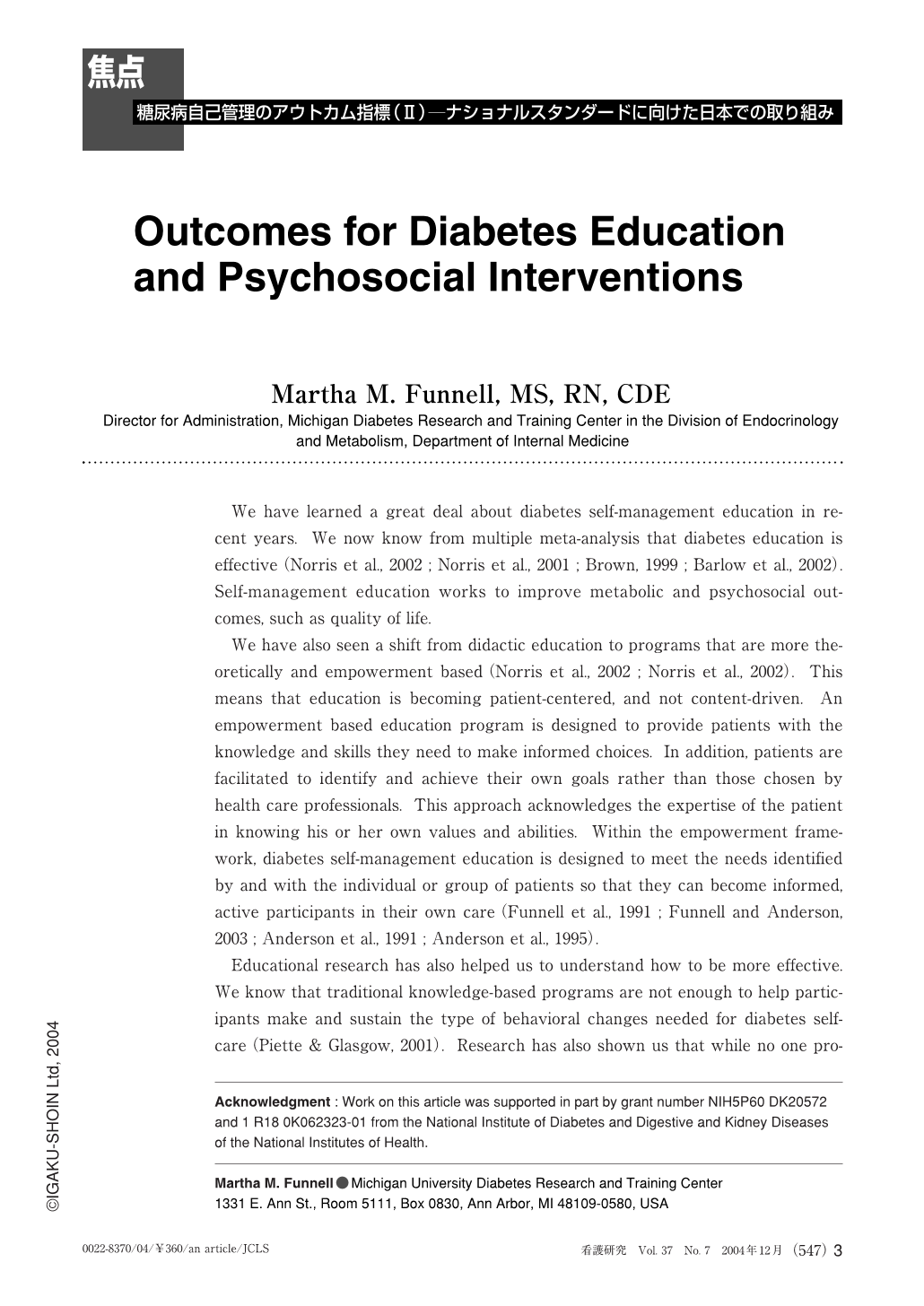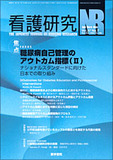Japanese
English
- 有料閲覧
- Abstract 文献概要
- 1ページ目 Look Inside
We have learned a great deal about diabetes self-management education in recent years. We now know from multiple meta-analysis that diabetes education is effective (Norris et al., 2002 ; Norris et al., 2001 ; Brown, 1999 ; Barlow et al., 2002). Self-management education works to improve metabolic and psychosocial outcomes, such as quality of life.
We have also seen a shift from didactic education to programs that are more theoretically and empowerment based (Norris et al., 2002 ; Norris et al., 2002). This means that education is becoming patient-centered, and not content-driven. An empowerment based education program is designed to provide patients with the knowledge and skills they need to make informed choices. In addition, patients are facilitated to identify and achieve their own goals rather than those chosen by health care professionals. This approach acknowledges the expertise of the patient in knowing his or her own values and abilities. Within the empowerment framework, diabetes self-management education is designed to meet the needs identified by and with the individual or group of patients so that they can become informed, active participants in their own care (Funnell et al., 1991 ; Funnell and Anderson, 2003 ; Anderson et al., 1991 ; Anderson et al., 1995).
Educational research has also helped us to understand how to be more effective. We know that traditional knowledge-based programs are not enough to help participants make and sustain the type of behavioral changes needed for diabetes self-care (Piette & Glasgow, 2001). Research has also shown us that while no one program is more effective than others, education that incorporates behavioral and affective aspects along with the information have better outcomes (Roter et al., 1998). The results of the DAWN study showed very clearly that people with diabetes find their diabetes distressing and difficult, even when they are able to effectively manage the metabolic and other self-care aspects (Alberti, 2002). The respondents in that survey also indicated that they wanted more help with these issues from their health care professionals.
But what does all of this really mean for the nurse caring for patients with diabetes? What are some strategies nurses can use to implement evidence-based approaches in our own practices and also to document our impact within the realities of our busy practices?
We have learned a great deal about diabetes self-management education in recent years. We now know from multiple meta-analysis that diabetes education is effective (Norris et al., 2002 ; Norris et al., 2001 ; Brown, 1999 ; Barlow et al., 2002). Self-management education works to improve metabolic and psychosocial outcomes, such as quality of life.
We have also seen a shift from didactic education to programs that are more theoretically and empowerment based (Norris et al., 2002 ; Norris et al., 2002). This means that education is becoming patient-centered, and not content-driven. An empowerment based education program is designed to provide patients with the knowledge and skills they need to make informed choices. In addition, patients are facilitated to identify and achieve their own goals rather than those chosen by health care professionals. This approach acknowledges the expertise of the patient in knowing his or her own values and abilities. Within the empowerment framework, diabetes self-management education is designed to meet the needs identified by and with the individual or group of patients so that they can become informed, active participants in their own care (Funnell et al., 1991 ; Funnell and Anderson, 2003 ; Anderson et al., 1991 ; Anderson et al., 1995).
Educational research has also helped us to understand how to be more effective. We know that traditional knowledge-based programs are not enough to help participants make and sustain the type of behavioral changes needed for diabetes self-care (Piette & Glasgow, 2001). Research has also shown us that while no one program is more effective than others, education that incorporates behavioral and affective aspects along with the information have better outcomes (Roter et al., 1998). The results of the DAWN study showed very clearly that people with diabetes find their diabetes distressing and difficult, even when they are able to effectively manage the metabolic and other self-care aspects (Alberti, 2002). The respondents in that survey also indicated that they wanted more help with these issues from their health care professionals.
But what does all of this really mean for the nurse caring for patients with diabetes? What are some strategies nurses can use to implement evidence-based approaches in our own practices and also to document our impact within the realities of our busy practices?

Copyright © 2004, Igaku-Shoin Ltd. All rights reserved.


